#つくね弁
Explore tagged Tumblr posts
Text
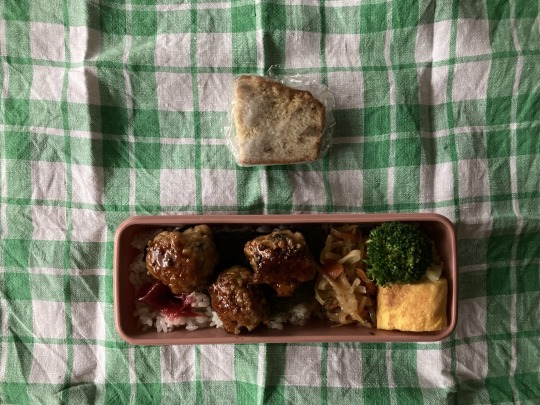
2025.4.1 tue
13 notes
·
View notes
Text










6月6日(金)open 12-19
今日も一日皆さまありがとうございました! 一番のお客さまは生まれてまだ一年も経たない、ぴかぴかの命。 大きくて澄んだ瞳で、庭の鳥たちや風で動くもの、私が声を発するとじっと見つめてニコニコしていました。 はぁ…赤ちゃんという生き物に触れると、心が磨かれたような気持ちになるのが不思議だね。 ありがとう。 それから中村一般さんの手描きのポップが風で落ちたのをきっかけに、中村さんと出会って本を選んでくれた方や、涙を流して一緒に笑いながら出口ワールドを楽しんでくれた常連のお客さまや、癒されに来ました〜と来てくれた建築士さん、岡野さんと佐内さんの本を選んでくださった最後のお客さま、などなど、一日があっという間でした。 届いた本たちを今日はストーリーズではなく、投稿にしてみます。 お取り置きなど、お気軽にお声掛けくださいね。
それでは明日は、お知らせの通り12時から17時半までの営業となります! ご不便をおかけいたしますが、何卒よろしくお願いいたします。
#新再入荷の本#スノードームの捨てかた#星沙たち#就職しないで生きるには#散文#透明になんかされるものか#ことばのくすり#ハマれないまま生きてます#つくることばいきることば#四角形の歴史#センスオブワンダー#ちいさな手のひら事典薬草#くらしがしごと#昼12時のお弁当研究所#アンソロジーたまご#作家とおしゃれ#わたくし96歳戦争反対#���木しげる戦記漫画名作コレクション#平和への願い#戦場の悲劇#もりのあさ#ねこまがたけ#ねむたいひとたち#ブルッキーのひつじ#せみのみんちゃんうまれたよ#ちょうちょちょうちょ#パパさんぽ#本屋#松本市#本中川
1 note
·
View note
Text
Well, um, hiya☆
I've come to life a little here and brought you some interesting features in the characters' spoken language
To begin with, let's look at the male trio of main characters: Naruhodō, Mitsurugi, Odoroki (Wright, Edgeworth, Justice)
Some people know it, some don't, but in Japanese there are many options for how to refer to yourself, i.e. "I" can be said with different pronouns and they are all ranked by gender (there are also gender-neutral ones) and the level of politeness.
The first one we have is Naruhodō.
He always, regardless of the situation, uses the pronoun "boku" (ぼく) in relation to himself.
僕 (ぼく)
僕 (boku) is a first-person pronoun often associated with male speakers. It has earnest, polite, cultured connotations. Overall, 僕 (boku) has a softer, less aggressive than 俺 (ore), another common pronoun with masculine connotations.
Naruhodō uses it both in the first trilogy, when he is 24-26 years old, and after the 7-year gap, when he is 33-35. It doesn't matter if he is in the courtroom or talking to friends - he always uses "boku".
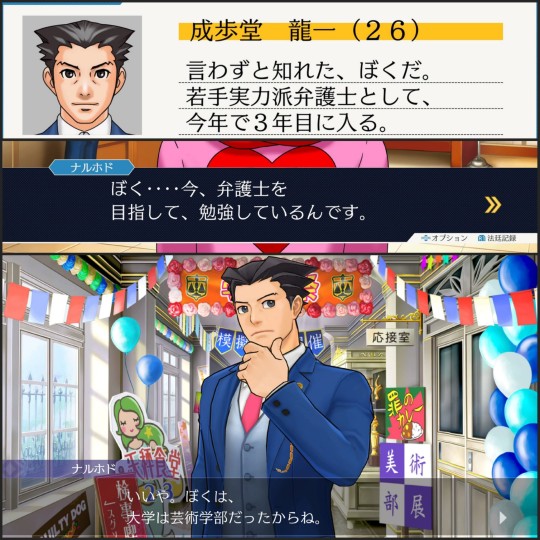
言わずと知れた、ぼくだ。 若手実力派弁護士として、 今年で3年目に入る。
Iwazu to shireta, bokuda. Wakate jitsuryoku-ha bengoshi to shite, kotoshi de 3-nen menihairu.
It goes without saying that it is me. I am a young and talented lawyer, and this is my third year in the industry.
___________________________________________
ぼく・・・・今、弁護士を 目指して、勉強しているんです。
boku ima, bengoshi o mezashite, benkyō shite iru ndesu.
I'm studying to become a lawyer.
___________________________________________
いいや。ぼくは、 大学は芸術学部だったからね。
Ī ya. Boku wa, daigaku wa geijutsu gakubudattakara ne.
No. I entered the arts department at the university.
___________________________________________
When addressing someone, Naruhodo uses pronoun "omae".
お前 (おまえ)
お前 is a second-person pronoun that's masculine and rough — it's often used for cussing! It could also be a way to show affection to close friends, partners, and family in a very casual manner.
It is curious that he only addresses Mitsurugi this way, while he addresses the others (Mayoi, Odoroki, etc.) by name + suffix (Mayoi-chan, Odoroki-kun).
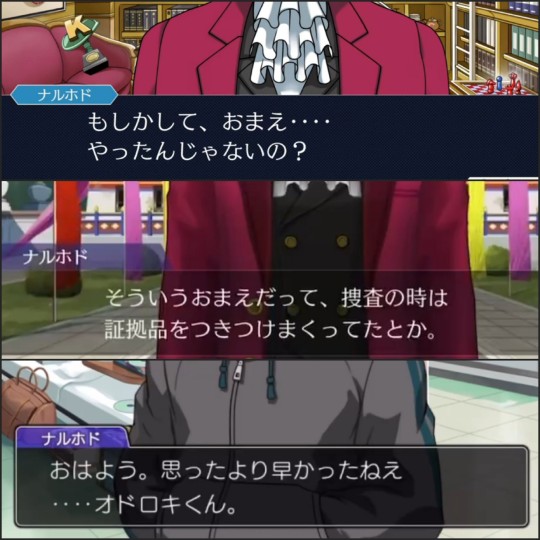
もしかして、おまえ・・・・ やったんじゃないの?
Moshikashite, omae yatta n janai no?
Maybe you... did it?
___________________________________________
そういうおまえだって、捜査の時は 証拠品をつきつけまくってたとか。
Sōiu omae datte, sōsa no toki wa shōko-hin o tsukitsuke makutteta to ka.
Even you, who is like that, apparently presented a lot of evidence during the investigation.
___________________________________________
おはよう。思ったより早かったねえ ・・・・オドロキくん。
Ohayō. Omottayori hayakatta ne e Odoroki-kun.
Good morning. It was earlier than I thought... Odoroki-kun.
___________________________________________
Next up we have Mitsurugi.
Mr. Politeness uses the pronoun "watashi" when referring to himself.
私 (わたし/わたくし)
わたし (watashi) is quite a common first-person pronoun as it's used regardless of gender, and both in casual and formal situations.It also has a certain elegant, sophisticated feel to it.
It also does not change over time, and is used by him both at 24-26 and at 34-35 years old.
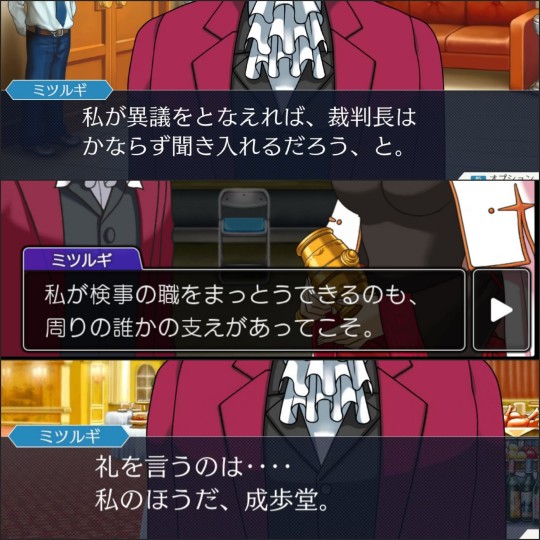
私が異議をとなえれば、裁判長は かならず聞き入れるだろう、と。
Watashi ga igi o tonaereba, saiban-chō wa kanarazu kikiirerudarou, to.
If I raised an objection, the judge would certainly listen.
___________________________________________
私が検事の職をまっとうできるのも、 周りの誰かの支えがあってこそ。
Watashi ga kenji no shoku o mattō dekiru no mo, mawari no dareka no sasae ga atte koso.
It is only thanks to the support of those around me that I am able to carry out my duties as a prosecutor.
___________________________________________
礼を言うのは・・・・ 私のほうだ、成歩堂。
rei o iu no wa watashi no hōda, Naruhodō.
I should be the one to thank you, Naruhodo.
___________________________________________
But he has a special attitude towards the informal address "you". And by the way, it depends on the situation Mitsurugi is in, and not on who he is addressing.
Because he uses at least 4 (maybe more, I couldn't catch them all) options of address!
The first is "omae". We have already discussed it, so I will not repeat myself. But the situation in which it is used is when Mitsurugi tries to be cheeky, when he makes fun of others (most often, of course, Naruhodō)
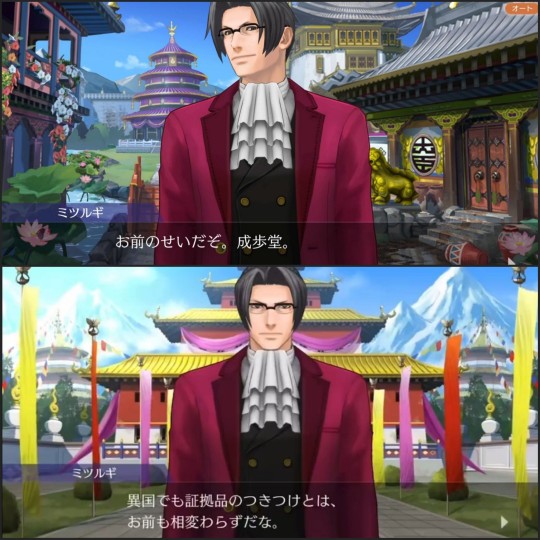
お前のせいだぞ。成歩堂。
Omae no seida zo. Naruhodō.
It's your fault, Naruhodō.
___________________________________________
異国でも証拠品のつきつけとは、
お前も相変わらずだな。
Ikoku demo shōko-hin no tsukitsuke to wa, omae mo aikawarazuda na.
You're still the same, presenting evidence even in a foreign country.
___________________________________________
Next, the address "kimi".
君 (きみ/キミ)
君 (kimi) is a second-person pronoun with various nuances. Some dictionaries define 君 as a pronoun you can use in a friendly way towards someone of equal or lower status. These days, however, the way 君 is perceived varies quite a bit from person to person.
Outside of hierarchical situations like the workplace, 君 is used a lot to sound literary or poetic.
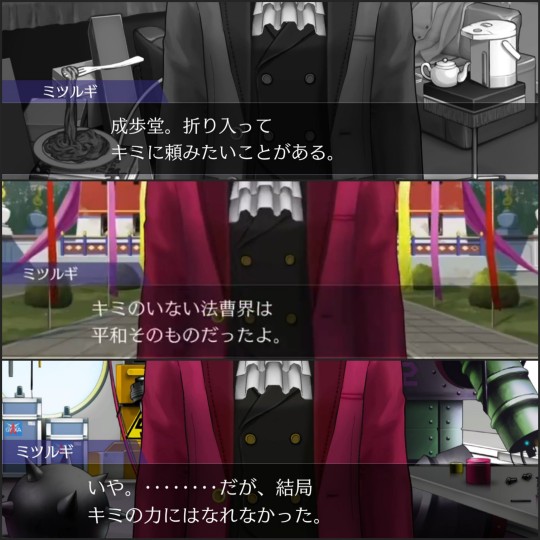
成歩堂。折り入って キミに頼みたいことがある。
Naruhodō. Oriitte kimi ni tanomitai koto ga aru.
Naruhodō. There's something I'd like to ask you.
___________________________________________
キミのいない法曹界は 平和そのものだったよ。
Kimi no inai hōsōkai wa heiwa sonomonodatta yo.
The legal profession would be at peace without you.
___________________________________________
いや。・・・・・・・・だが、結局 キミの力にはなれなかった���
Īya. Daga, kekkyoku kimi no chikara ni hanarenakatta.
No... But in the end, I couldn't be of any help to you.
In the example, Mitsurugi asks Naruhodō for help, so I don't think it's a hierarchy thing. It's more of an equal thing. (Correct me if I'm wrong)
___________________________________________
And then comes the most epic part. Kisama.
貴様 (きさま/キサマ)
貴様 (kisama) is a second-person pronoun that's masculine and rough, it's often in combination with vulgar language!
Although it's associated with masculinity, that doesn't mean it's a pronoun only for men. Even if you don't use 貴様 regularly, it's a great way of expressing your anger.
貴様 can also be a way to show affection in a very casual way towards close friends, partners, and family. In this case, the above example would be playful, rather than showing genuine anger.
Mitsurugi uses it when he gets angry (usually in the courtroom) and sometimes in relation to friends. So, the area of application is justified by its purpose as a pronoun.
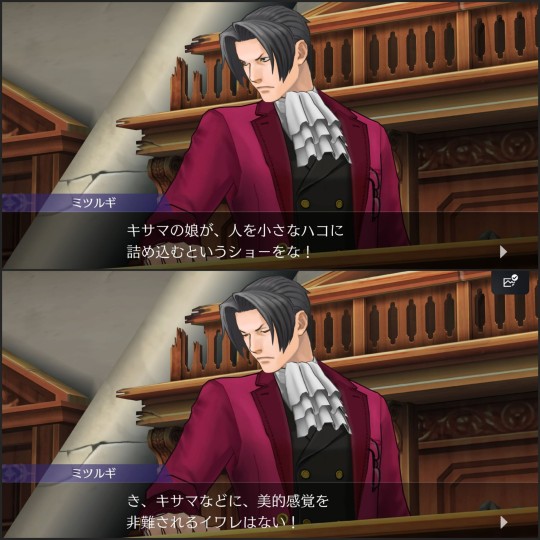
キサマの娘が、人を小さなハコに 詰め込むというショーをな!
Kisama no musume ga, hito o chīsana Hako ni tsumekomu to iu shō o na!
Your daughter puts people into tiny boxes in a show!
___________________________________________
き、キサマなどに、美的感覚を 非難されるイワレはない!
kisama nado ni, biteki kankaku o hinan sa reru iware wanai!
You have no right to criticize aesthetic sense!
And the last one - addressing by name + suffix or without suffix (Mayoi-kun, Naruhodō)
___________________________________________
Next - Odoroki Hosuke (Apollo Justice)
He's a real manly man, haha. He always uses the pronoun "ore".
俺 (おれ/オレ)
俺 (ore) is a first-person pronoun with a strong masculine feel. It sounds "manly" and less gentle than 僕. 俺 is also a pretty casual pronoun and can be seen as vulgar, especially when used in formal situations. In order to use 俺 naturally, the speech style also needs to match the manliness of 俺.
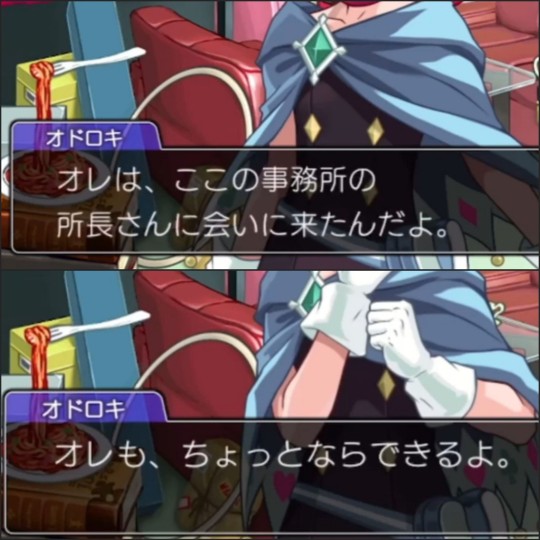
オレは、ここの事務所の 所長さんに会いに来たんだよ。
ore wa, koko no jimusho no shochō-san ni ai ni kita nda yo.
I came here to see the director of this office.
___________________________________________
オレも、ちょっとならできるよ。
A odoroki ore mo, chottonara dekiru yo.
I can do it a little bit magic too.
___________________________________________
But he doesn't bother with addressing others, and always addresses them by name + suffix (Naruhodo-san, Minuki-chan, Garyu-kenji, Mitsurugi-kenji)
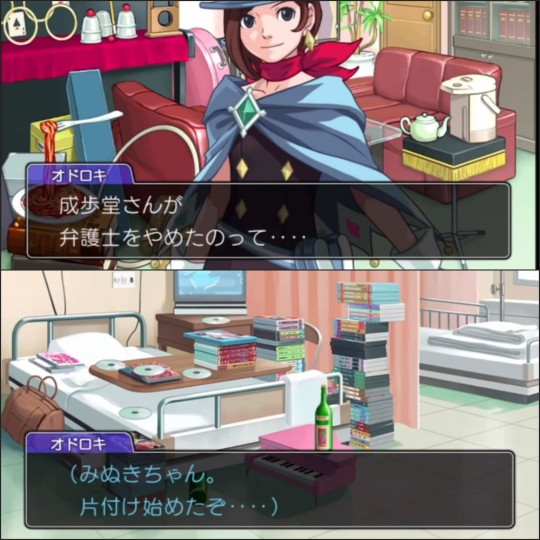
成歩堂さんが 弁護士をやめたのって・・・・
Naruhodō-san ga bengoshi o yameta notte
Naruhodō-san quit being a lawyer...
___________________________________________
(みぬきちゃん��� 片付け始めたぞ・・・・)
(Minuki-chan. Katadzuke hajimeta zo)
(Minuki-chan, you're starting to clean up...)
___________________________________________
P.S.
I hope this will clarify the characters a bit and give you a new perspective on them.
One day, I'll do the same with the main female characters (because it takes a lot of time, but I bless those who post screen recordings and screenshots, thanks to them I can quickly find the right moment).
There may be errors and typos, don't be afraid to point them out to me
#ace attorney#gyakuten saiban#naruhodou ryuuichi#phoenix wright#miles edgeworth#mitsurugi reiji#odoroki housuke#apollo justice#omg i did this#time to rest a little#😴#naruhodo ryuichi
496 notes
·
View notes
Text

にっこうよく。日光浴。日光佳く。
ねこの日なので22枚いきたかったが今日はこれにて。
いつもより少し増量でご勘弁を。
Sunbathing.
239 notes
·
View notes
Quote
民主党政権のほうが明らかに酷いです。「民主党政権の何が悪夢だったのか、きちんとした説明を聞いたことがない!」といった主張は定期的に出現しますが、さすがに「聞いたことない」なんてはずはないので、おそらく「自分の気に入る説明ではない」という意味か、「バカに分かるように説明したところで、そもそもバカは聞いてない」パターンのいずれかとは思いますが。 前回の悪夢のような民主党政権時代を生き抜いてきた者として私が言えるのは、「とにかく、あのような惨劇は二度と繰り返してはならない」ということだけです。 歴史修正は容赦できません。あの時代がいかに酷いものであったか、ご存知ない方もぜひこの機会に知って頂きたいので、支持者から叩かれること覚悟で説明していきますね(過去同様の投稿を複数おこなっていますが、毎回更新改訂しています。今般のバージョンが最新版です)。 個人的に、「悪夢の民主党政権���における大きな問題点は次の3点と考えています。 (1)国家運営能力の欠如により、内政上の失敗を数多く引き起こし、国益を損ない続けた。 (2)拙劣な外交を繰り返し、日米関係をはじめ、周辺諸国からの信頼を大きく毀損した。 (3)総理・閣僚をはじめとする所属議員の度重なる不祥事や、自分たちに都合が悪い情報を隠蔽する体質によって、国民の政治に対する信頼を失い続けた。 では、それぞれどんなことがあったか振り返っていきましょう。これがわずか3年間で起きた出来事です。はらわたが煮えくり返る覚悟で読み進めてください。 (1)国家運営能力の欠如 ・財源の見込みが甘く、政権交代の際に掲げたマニフェストはほぼ未達成。 ・官僚を敵視して排除し、国家業務の停滞と質低下を招いた。 ・金融政策と財政政策が食い違い、タイミングの悪い増税も重なり、景気や株価は低迷を続けた。 ・歴史的水準まで進んだ円高を放置し、デフレを加速させた。 ・法的根拠がないばかりでなく、仕分人の選定や対象事業選定にも透明性を欠いた「事業仕分け」をデフレ時におこない、必要な公共投資を削減。経済を悪化させたにも関わらず、結果に責任を負わなかった。 ・「コンクリートから人へ」という誤った政策により、災害対策を疎かにしたうえ、地域社会を破壊した。 ・「朝鮮王室儀軌引渡」「尖閣事件の船長釈放」「運用3号通知」「国家公務員採用大幅減」など、閣僚たちが思い付きレベルの意思決定を独断でおこない、結果的に我が国の将来に禍根を残した。 ・難民申請から6カ月たった申請者に対し一律に就労できる運用を始めた。 ・法的根拠のない組織を乱立させ、意思決定過程が曖昧になり、指揮命令系統も混乱。 ・法的根拠のない大臣や副大臣を任命したり、個人的な友人を参与に、党職員を内閣官房職員に任命するなど、ルールを無視、公私の別がつかない人事を実施。 ・原発停止、ダム建設中止など、法令根拠や事前協議が必要な決定を手続無視で断���。 (2)外交能力の欠如 ・普天間基地問題が迷走し、沖縄とアメリカの信頼を大きく損なった。 ・来日したオバマ大統領を日本に残したまま、鳩山総理がAPEC首脳会議に出席するためにシンガポールに向かうという非礼行為。 ・尖閣沖漁船衝突事件では、中国側の脅迫や報復に屈して船長を早々に釈放、不起訴に。その後の尖閣諸島国有化でも迷走。 ・領空侵犯が頻発するも、実効的な対策をとらず。 ・防衛上特に秘匿することが必要な「防衛秘密」3万件を破棄。 ・韓国に対しては、通貨スワップ協定締結、朝鮮王室儀軌引渡し、慰安婦問題での「知恵を絞っていきたい」発言など、不用意な譲歩を重ねた。 ・韓国の歴代大統領として初めて、竹島へ李明博大統領が上陸。 ・旧ソ連時代を含めて初めて、北方領土へロシア国家元首が上陸。 ・実現に向けた方策が何ら決まっていない状態で、国連気候変動サミットにおいて「CO2の25%削減」を突如国際公約化。 ・実現の見込みも全くないまま、G8の場で、「太陽光パネルを1000万戸に設置する」と突如国際公約をおこなった。 (3)閣僚・所属議員の度重なる不祥事と情報隠蔽体質 ・鳩山総理⇒偽装献金問題、脱税問題、引退撤回、「最低でも県外」「Trust me」「国民の皆様が聞く耳を持たなくなった」 ・菅(直人)総理⇒外国人献金問題、北朝鮮関係団体献金問題、「顔が見たくなければ法案を通せ」 ・野田総理⇒在日韓国人献金問題、脱税企業献金問題、民団選挙協力お礼発言、「大きな音だね」 ・小沢元代表⇒政治資金規正法違反容疑で強制起訴(無罪判決)、献金虚偽記載で公設秘書が逮捕(有罪判決) ・仙谷官房長官⇒尖閣漁船衝突事件、「自衛隊は暴力装置」 ・赤松農水大臣⇒口蹄疫問題、「だから早く殺せって言ってるのに」 ・松本復興担当大臣⇒「知恵を出さないやつは助けない」「書いたらその社は終わりだから」 ・長妻厚労大臣⇒運用3号独断決定、職務停滞 ��蓮舫行政刷新担当大臣⇒事務所費架空計上問題、国会内ファッション雑誌撮影、「2位じゃダメなんでしょうか?」 ・安住財務大臣⇒「1ドル75.63円の時点で介入を指示した」「学校のプールにガソリンを貯蔵できないか」 ・前原外務大臣⇒外国人から政治献金受領 ・岡田外務大臣⇒「核兵器めぐる日米密約は存在した」 ・川端文科大臣⇒事務所費架空計上問題、キャバクラ費用を政治資金で計上 ・鹿野農水大臣⇒対中不正輸出疑惑、機密漏洩疑惑 ・鉢呂経産大臣⇒(記者の一人に、着ていた防災服をなすりつけ)「放射能つけちゃうぞ」「市街地は人っ子一人いない、まさに『死のまち』」 ・一川防衛大臣⇒「安全保障に関しては素人」 ・柳田法務大臣⇒「答弁は二つだけ覚えておけばいい」 ・山岡消費者担当大臣⇒マルチ商法業者からの献金問題 ・岡崎国家公安委員長⇒議員時代、韓国で日本大使館に対する反日抗議デモに参加 ・中井国家公安委員長⇒議員宿舎にホステス連れ込み&カードキー貸与、式典で秋篠宮ご夫妻に「早く座れよ」とヤジ ・輿石幹事長⇒「間違った情報ばかり流すなら、電波を止めてしまうぞ」「電波が止まったら、お前らリストラどころか、給料をもらえず全員クビになるんだ」 ・小林議員⇒違法献金問題で選対委員長が逮捕、選対幹部が公職選挙法違反で有罪 ・土肥議員⇒竹島領有権放棄を日本側に求める「日韓共同宣言」に署名 ・横峯議員⇒賭けゴルフ、女性暴行、恐喝事件への関与 ・緒方議員⇒「スーパー堤防はスーパー無駄遣い」 ・太田議員⇒「そうでしたっけ? フフフ」 ・原発事故対応(SPEEDI、米実測値の非公表、議事録不作成など)、尖閣ビデオ、北朝鮮ミサイル発射への対応、温暖化対策の家計負担、年金改革の財政試算 など、自分たちに都合が悪い情報は隠蔽し、政府への深刻な不信感を招いた。 ・総理-閣僚間で見解の方向性や意見の不一致が常態化。それらも含め、自民党で同様の事態があれば野党のみならずマスコミも総出で吊し上げられる事態となるが、マスコミも概ね民主党に好意的な報道姿勢。 そんなに民主党時代が良かったなら、下野以降何度でも政権を取り戻すチャンスはあったはず。なのにただ一度もそうなっていないということは、それが民意ということです。私はあんな地獄のような時代は二度と御免です。
Xユーザーの新田 龍さん: 「民主党政権のほうが明らかに酷いです。「民主党政権の何が悪夢だったのか、きちんとした説明を聞いたことがない!」といった主張は定期的に出現しますが、さすがに「聞いたことない」なんてはずはないので、おそらく「自分の気に入る説明ではない」という意味か、「バカに分かるように説明したところで」 / X
147 notes
·
View notes
Quote
給食がほとんど食べられず小学5年生までは地獄のような給食時間を過ごしてきた私は、6年生になって担任から「給食やめて弁当にしよう!診断書をもらってきてくれたら校長先生と交渉するから」と言われる。 発達障害の診断もでなかった私には主治医はおらず、病院嫌いなのでかかりつけ医もいない。「弁当にしょう」という診断書はどこに行けば書いてもらえるのか親は悩みまくって、ついに、思春期摂食障害専門の児童精神科医にたどり着く。 診察で事情を話したら、「今までよく頑張ったな。先生が給食やめたほうがいいって手紙を書いてあげるから、安心していいよ。好きなものだけ食べて生きていいんだぞ。ここからの人生、楽しむんだぞ」って言ってくれたんですよね。 あの時の安堵感は半端なかった。私の場合は1度だけの関わりだったど、児童精神科の先生は会った瞬間い味方になったくれたような感覚がありました。
Xユーザーの加藤路瑛@感覚過敏研究所さん: 「給食がほとんど食べられず小学5年生までは地獄のような給食時間を過ごしてきた私は、6年生になって担任から「給食やめて弁当にしよう!診断書をもらってきてくれたら校長先生と交渉するから」と言われる。」 / Twitter
261 notes
·
View notes
Text
What the ghouls from the same house think about each other
It’s one of the questions that appeared in the latest B’s-log magazine issue. I decided to share this one because it’s fun.
DISCLAIMER: I’m not a translator, so please take this with a huge grain of salt because I don’t speak let alone read Japanese very well. I mostly used machine translation and some of the little knowledge I have to get through this. I added the original Japanese script if you wanna read that on your own.
Jin, Tohma, Ren and Subaru didn’t receive the question unfortunately
Frostheim
Lucas: “Ever since I transferred to this school, Kaito has been my first friend and has always been very kind to me. I'm also grateful to Ishibashi-san for all his help. As for Kamurai-san, I hope he'll just fulfill his duties...”
「この学園へ転校してきた日から、魁斗は俺の初め ての友人として、ずっと仲良くしてくれている。そ れに磴さんにも、とてもお世話になっているよ。あ とは、冠氷さんが責務さえ果たしてくれれば良いん だけど・・・・・・」
Kaito: “Hmm... To be honest, the captain and vice-captain seem like people way above the clouds... Rumor has it that the two of them are in collusion with the school and are doing terrible things. What? Luca? ...I've never heard of such a faceless bastard.”
「ん~………………寮長と副寮長は、正直雲の上の人って感 じだしな〜………………噂では、ふたりとも学園と癒着して、 えげつないことやってるって聞いたことあるけど。え? ルカ? ………………あんな顔面無双野郎なんか知らね」
*I’m really not sure what あんな顔面無双野郎 means.
Vagastorm
Alan: “We're just half-baked people who happened to have powers. But they're willing to die and crawl back up... they have the potential.”
「俺たちは、たまたま力を持っただけの半端もんだ。 だが、死ぬ気で這い上がる・・・・・・あいつらには、その 素質がある」
Leo: “No matter how you look at it, our captain is a complete loser. As for Sho-chan... I guess he's my slave♡”
「誰がどう見ても、うちの寮長サマはポンコツでし ○よ。え~、翔ちゃんはね・・・・・・オレの奴隷、かな♡」
Sho: “Ahh... Leo and I are just old friends. We've been hanging out since middle school. Mido-senpai... I don't really know what he's thinking. He's a man of few words, right?”
「あー…………………玲音とはただの腐れ縁な。中坊の頃か ら、なんとなくつるんでるっつうか。御堂センパイ は・・・・・・何考えてっかよくわかんねぇわ。あいつ、言 葉が足りねぇタイプじゃん?」
Jabberwock
Haru: “Both Ren and Towa have good bodies, so if they could put that into use and work, they'd be a lot more reliable than they are now...huh? What's that sound...Hey Towa! Wait a sec!!”
「蓮も叶空も、せっかくええガタイ持っとるけぇ、 そいつ活かして働いてくれりゃ、今よりずっと頼も しいんじゃがのう・・・・・・ん?この音は・・・・・・おい叶空! ちょ~~~待て~~~~~~~!!」
Towa: ~~~~♪~~~~!!
Sinostra
Taiga: “That Lulu gets so angry every day, I don't know how he never gets tired of it... Ah? Shinjo? Who’s that?”
「ルルのやつ、毎日あんなキレまくって、よく飽き ねぇよな~・・・・・・・あ〜? シンジョ? 誰だそれ」
Romeo: “I’m disgusted by my boss. No matter how many times I say the same thing, it's WEFCP. What? It's "waste of effort", "fist-clenching" and "pressing". As for Shinjo, I'm going to give him a thorough training from now on, and we'll see how he turns out.”
「うちのボスには呆れる。なんべん同じこと言った って、N・U・Oだから���ぁ。は?「暖簾に」「腕」「押し」 だよ。まぁ針条に関しては、これからみっちり教育して、 どう化けるかってとこだねぇ」
*I tried my best to translate Romeo’s abbreviation but it’s still bad I’m sorry…
Ritsu: "I have concluded that it is futile to try to change the tyrannical behavior of our Sinostra’s captain, Taiga Hoshibami, and vice-captain, Romeo Scorpius Lucci. From now on, I will defend them and definitely obtain the 'Laurel Crown'."
「我がシノストラ寮長の星喰大我、および副寮長 のロミオ・スコーピウス・ルッチについて、その横暴 な素行を改めることは不毛という結論です。今後は、 私が彼らを弁護することで、必ず『栄冠賞』を手に入 れてみせます」
Hotarubi
Haku: “Another difficult question. Hmm... Subaru-san is simply great. However, his tendency to take on too much is his only flaw. Zenji-san... Well, you see, being with him makes me feel energized. I'm grateful for that.”
「また難しい質問ですこと。うーん・・・・・・昴流さんは とにかく出来が良い。ただ、何かと抱え込みすぎる のが玉に瑕だな。善治さんは・・・・・・まあ、あれだ、一 緒にいると元気になる。ありがたいことですよ」
Zenji: “If I had to describe Subaru-kun in one word, it would be...heart of glass...but in contrast, I can't help but worry about Haku-kun's lack of enthusiasm. As my manager, I would say he should be a bit more considerate.”
「昴流クンを一言で表すならば・・・・・・ハート・オブ・グ ラス・・・・・・それに引き替え、伯玖クンのスコドンぶり には気を揉まずにはいられないよ。ボクのマネージ ャーならば、もう少し気が利くべきだと言っている のだがねえ」
*Zenji says “hāto obu gurasu”, I’m not sure, but I think he means to say heart of gold? lmao
Obscuary
Edward: These two are young and strong, I'm so envious of them. When I was their age... Oops, it was so long ago that I’ve completely forgotten."
「ふたりとも、若くて体力もあって羨ましい限りだよ。 俺があの子たちと同じ年頃の時は・・・・・・おっと。もう 随分昔のことだから、すっかり忘れてしまったな」
Rui: “Ed-san has no ability to live on his own, so he's really a pain to look after. At this point, I’m in charge of nursing care... and then what about Lyca-kun... Huh? I'm taking care of the kids... What do those two think of me!?”
「エドさんは生活力なさすぎて、ほんと世話が焼け るんよね。もはや介護っしょあれ・・・・・・そんでライカ くんは~・・・・・・・あれ? こっちは子供の世話だ・・・・・・あ のふたり、俺ちゃんをなんだと思ってんの!?」
Lyca: “They're that moth-eaten Casanova and that blond gigolo. I'm human, so why am I not in the same place as Suba-kun and the others!!”
「色魔ジジイと金髪ジゴロだろ。おれは人間なのに、 なんでスバくんたちと同じとこじゃねーんだよ!!」
Mortkranken
Yuri: “You're talking about Jiro-kun, who is both Yuri Isami's assistant and patient? He's still in training. He still lacks knowledge, skills, experience, and culture. It'll probably take another 100 years for him to become a doctor at my level.”
「この衣佐美佑理の助手であり、患者でもある次郎 くんのことです? 彼は研修中の身ですからね。ま だまだ、知識も技術も経験も教養も足りていません。 僕レベルの医師になるまで、あと100年は必要でしょう」
Jiro: “Oh, the only ghoul in my house is Yuri. He's my doctor. If it weren't for Yuri, I'd probably be dead by now. Well, I'm grateful.”
「はあ、同じ寮のグールは、佑理しかいませんけど。 俺の主治医ですね。佑理がいなければ、俺、今頃死 んでるらしいんで。まあ、感謝してます」
If a professional sees this, feel free to translate it yourself
#tokyo debunker#lucas errant#kaito fuji#vagastorm#alan mido#leo kurosagi#sho haizono#haru sagara#sinostra#taiga hoshibami#romeo lucci#ritsu shinjo#haku kusanagi#zenji kotodama#obscuary#edward hart#rui mizuki#lyca colt#mortkranken#yuri isami#jiro kirisaki
318 notes
·
View notes
Quote
このポストを読んで「お兄さん」が頼もしいと思った人は、DV・モラハラ加害者に捕まる可能性が高いです。 日常生活の選択肢に暴力が含まれている人は、あなたにとって望ましくない人にだけ暴力を振るうわけではありません。 あなたへも暴力を振るうようになります。 なお、言うまでもないですが、女性ばかりに絡む大声罵り系の男は論外です。 この「お兄さん」、実は「飲食店の従業員に対して暴力的に振舞う男性」の亜種なんですよ。 電車で迷惑行為をする男性は悪い奴だから攻撃してもよいって認定して、暴力的に振舞っている。 電車内の迷惑行為を止めるためだけなら、ここまで暴力的な対応をする必要はないですから。
Xユーザーの弁護士 柴田収@「毒親絶縁の手引き」絶賛発売中さん
銀座線で女性ばかりに絡む大声罵り系の男と遭遇した時、私の隣の吊り革に捕まっていたお兄さんが「怖いですよね、大丈夫ですよ」って優しく声をかけてくれたんですよ 直後お兄さんは豹変、「自分より弱いやつばっかにイキってんじゃねぇぞ、オラァ!俺に同じことしてみろやァァ!」って迷惑男に突進�� 逃げんじゃねえよ、オラァ!って人をかき分けてとっ捕まえてガン詰めの後、次の駅伝そいつを引きずって、お兄さんは颯爽と降りて行きました 本当にありがとうございました!
66 notes
·
View notes
Text
Phoenix's careful wording in 4-1
I noticed something about 4-1, Turnabout Trump. Phoenix uses very careful wording. He never outright lies, mostly misdirects. Like when he's asked if the locket is his, and he says the locket has his daughter's photo inside. But the most important misdirection here is about the forged card. He never shows it as actual evidence from the crime scene: if you look carefully at his words, he actually shows it as evidence of the reason why the killer would have taken the card. He's even meticulous about verb choices. In the ENG ver,, he even outright says the card is his. Everyone simply assumes. Also Apollo, unknowingly, doesn't present it as evidence from the crime scene, either. Anyway, here are some parts I found particularly incriminating. JP text beside ENG for comparison's sake. I'll only provide translation for the relevant parts (or the parts that differ between versions). But as you can see, the misdirection is there in the JP version as well. Disclaimer : I only studied Japanese for a little while. AA dialogue is pretty simple though. Also English isn't my native language either. Feel free to correct me on anything wrong here. Also note that I'm not trying to make the translations sound natural, I'm mostly trying to explain what the words are saying, sometimes I'll be more literal than others. Translation =/= localization. Translation notes and musings are in small text.
Judge いかがですかな? 弁護人。 Well, Mr. Justice? カードがスリ替えられて、 持ち去られた“理由”‥‥ The question of why the killer would swap out a card has been raised. そのコンキョを提示できますか? Can you point to a reason? Apollo (‥‥どうやら、 ここが“勝負どころ”だ!) (…It's now or never!) なぜ、カードは スリ替えられたのか‥‥。 Naze, kaado wa surikaerareta no ka... The defense would like to present evidence to the court… Naze, kaado wa surikaerareta no ka... Why the card was switched... 弁護側は、その“理由”を 提示したいと思います。 Bengogawa wa, sono "riyuu" o teiji shitai to omoimasu. Evidence showing the reason why a card was swapped out! Bengogawa wa, sono "riyuu" o teiji shitai to omoimasu. The defense would like to present that "reason".
Judge これは‥‥まさか! Could… this be…!? 現場から持ち去られた “5枚目のA”ですかッ! Could this be the missing fifth ace!? Kristoph ば‥‥バカな! なぜ‥‥なぜ、キミが‥‥ In-Inconceivable! How could you… そんなものを持っているのだッ! What are you doing with that card!? Apollo そ、それは‥‥その��� (なんだ、このあわてようは‥‥) Um, well, that's the thing… (Why's Mr. Gavin so upset?) (アヤシイ女の子からもらった、 ただのアヤシイカードなのに) (Ayashii onna no ko kara moratta, tada no ayashii kaado na noni) (It's just a fishy card from some fishy girl…) (Ayashii onna no ko kara moratta, tada no ayashii kaado na noni) It's just a suspicious card given by a suspicious girl... Apollo doesn't even understand the weight of the card when he presents it. He's just doing what Phoenix is pointing him to. He thinks it's just a suspicious card, and he's only using it to provide a "reason". At first, I was confused by this, because he seemed convinced later on that the card was real. But it appears that at first, he was indeed suspicious of it. It's just as the trial goes on, he's manipulated to think the card is indeed real. Because he trusts Mr. Wright, which *seems* to say it's real. Phoenix そのカードはね。 あの晩、事件の後‥‥ 《ボルハチ》で、 ぼくが拾ったんだよ。 Sono kaado wa ne. Ano ban, jiken no ato... "Boruhachi" de, boku ga hirotta n da yo. Oh, that card? It's mine. That is, I picked it up at the Borscht Bowl Club that night after the murder had occurred. カードは商売道具だからね。 ‥‥ムスメにわたしておいたんだ。 Kaado wa shoubai dougu dakara ne. ...Musume ni watashite oita n da. I gave it to my daughter. Cards are her stock and trade, after all. In the ENG, 'It's mine' is actually an addition. Maybe to drive the point home more? The rest is the same though.
Phoenix じゃ、ハナシをつづけようか。 Ja, hanashi o tsuzukeyou ka. Allow me to elaborate. Ja, hanashi o tsuzukeyou ka. Well then, let's continue this discussion? (fun fact: hanashi can also be traslated as 'story', or even 'fable', you could say hanashi is the noun version of the verb hanasu (to talk, tell) so it's basically anything you 'talk' about) この“血痕”が原因だった としたら、どうでしょう。 Kono "kekkan" ga gen'in datta to shitara, dou deshou. What if this trace of blood was the reason? Kono "kekkan" ga gen'in datta to shitara, dou deshou. (what) If this ''bloodstain'' was the cause... what do you think? The 'dou deshou' is usually also traslated as 'what do you think?' - it's used after you make a statement and you want to ask for the other person's opinion. But mostly it's a rethoric question. 'What about it?' would also fit. Also interesting how "bloodstain" is in quotation marks...
Phoenix 現場写真‥‥被害者の頭部を もう一度、よく見てください。 Take another look at the photo… and at the victim's head. 犯行の瞬間、帽子は床に落ちて、 このとおり‥‥ At the moment of the crime, his hat fell to the floor… ひとすじの血が、 後頭部に向かって流れています。 …and a trickle of blood ran from his forehead down the back of his head. この血が、一滴。カードに落ちた。 ‥‥そうは考えられないでしょうか。 Kono chi ga, hitoshizuku. Kaado ni ochita. ...Sou wa kangaerarenai deshou ka. Couldn't a drop of that blood have fallen on one of the cards? Kono chi ga, hitoshizuku. Kaado ni ochita. ...Sou wa kangaerarenai deshou ka. This blood, this drop. Fell on the card. ...Is that unthinkable? / ...Is that unimaginable? He's basically proposing a theory. Not said the card in Apollo's hand is actually the one. Apollo カードに、血が‥‥ Kaado ni, chi ga... I suppose… Kaado ni, chi ga... On the card, the blood (fell)... Apollo is following along with what he's saying. Phoenix ハンニンは、それをかくすために カードを持ち去ったのです。 Hannin wa, sore o kakusu tame ni kaado o mochisatta no desu. The killer then took the card to hide the blood. Fun choice of words. 'no desu' = 'the explaination is that...' or, in this case: 'the explaination would be...' This is the more literal translation just to make it more obvious how he phrases it: The culprit, in order to hide that he took the card the explaination would be So in a way that it's actually comprehensible: The explaination would be that the culprit took the card in order to hide that (the blood).
Kristoph 成歩堂! キミも 一度は法廷に立ったオトコだ。 Wright! Regardless of how you wasted the last seven years, you used to be a lawyer! 証拠品を隠すことが、 どれだけ大きな“罪”であるか‥‥ You know what a serious crime it is to conceal evidence! Phoenix そのギロンはあとだよ、先生。 それよりも‥‥ Sono giron wa ato da yo, sensei. Sore yori mo... Oh, we can discuss the finer points of our legal system later… Found it funny how he calls him 'sensei' but in a way that is very mccking. 'Sensei' means someone who is masterful/very knowledgeable in something, in this context, law. He says 'Let's leave that discussion for later, sensei. More importantly...' これで、きみの疑問に 答えるコトができたようだね。 Kore de, kimi no gimon ni kotaeru koto ga dekita you da ne. What's important now is that I've answered your question. Kore de, kimi no gimon ni kotaeru koto ga dekita you da ne. And with that, I was able to answer your question, wasn't I? Basically says the same thing, but uses 'dekiru' = 'to be able to' Kristoph な。なんのコトですか? Wh-What are you talking about? Phoenix ハンニンがカードを 持ち去った“理由”だよ。 Hannin ga kaado o mochisatta "riyuu" da yo. You wanted to know why the killer would have taken a card from the crime scene. Hannin ga kaado o mochisatta "riyuu" da yo. The "reason" the culprit took the card. カードに残った、1滴の血。 Kaado ni nokotta, hitoshizuku no chi. And now, I've told you. A drop of blood, it feel on the card. (That was why) 彼にとっては“致命的”だった。 ‥‥だから、持ち去った。 Kare ni totte wa "chimeiteki" datta. ...Dakara, mochisatta. That one drop of blood would have been decisive evidence, you see. Kare ni totte wa "chimeiteki" datta. ...Dakara, mochisatta. For him, that (the drop of blood) was 'fatal'. ...So, he took it.
Overall, the word choice in both JP and ENG is very careful, but in different ways since... obviously they're different languages with different idiosyncrasies. In conclusion....
Phoenix basically treated the card not as evidence from a crime scene, but more of an example, a recreation, a construction. Never said that was the actual card. Made people assume. Didn't correct them. So... he manipulated their thoughts. He's like 'oh, you want to know the reason? well, let's see, why would the killer take the card...? well maybe it had incriminating evidence on it - oh what kind of evidence? look at this card here - see this drop of blood? what if the blood fell from the victim's head on the card? so he had to take it - because it would have made it obvious the killer entered from the secret passage and how the murder actually happened' Something that breaks my heart immensly about all this is that Apollo is so adamant at the start of the trial that Mr. Wright would never lie... and he's furious and heartbroken that he basically manipulated him (and everyone else), instead. Phoenix literally couldn't lie anyway, because then Apollo would have known. If you think about it, it's kind of how Engarde was able to lie to Phoenix even though he had the magatama. He purposefully and meticulously manipulated people to think the evidence was real, without ever saying it. Putting the words in other people's mouths. (Also... at least to me, this seems a very prosecutor-like tactic. Perhaps even Von Karma-like.)
Why does he even tell Apollo that he forged it? (He didn't have to.) Because he felt guilty. Apollo asks how he can call himself an attorney and he tells him he, in fact, doesn't call himself one. Doesn't have the right to. Phoenix isn't a liar - he says so himself after the trial, he never lied - but he sure is a manipulator here. But he does feel guilty. He lets Apollo punch him. And he smiles. I think this shows how even when we believe that what we're doing is wrong, we might do it anyways. Out of desperation, anyone might cave and go against their own morals.
#ace attorney#phoenix wright#apollo justice#kristoph gavin#ace attorney apollo justice#musings#aa musings#aa localization
254 notes
·
View notes
Text
a vocab list for your tuesday

nouns:
素顔(すがお) = bare face, face with no makeup
トンズラ = fleeing, escaping
復讐(ふくしゅう) = revenge
しかめっ面(つら) = frown, scowl
買い被り(かいかぶり) = overestimation
ひじ = elbow
婚約(こんやく) = engagement, betrothal (marriage)
婚約者(こんやくしゃ) = fiancé(e)
お目通り(めどおり) = audience (with a higher-up)
家柄(いえがら) = social standing of a family/lineage
火の手(ひのて) = fire, blaze
一説(いっせつ) = one theory/opinion
憶測(おくそく) = guess, supposition
貧乏舌(びんぼうじた) = unsophisticated palate
手際(てぎわ) = performance, skill, dexterity
横取り(よこどり) = snatching, usurpation
本題(ほんだい) = main question, real issue at hand
徒労(とろう) = fruitless effort, futility
勘弁(かんべん) = pardon, forgiveness
verbs:
持て余す(もてあます) = to be too much for one, find unmanageable, not know what to do with
かこつける = to use as a pretext/excuse
汚す(けがす) = to disgrace, dishonor, defile
読み聞かせる(よみきかせる) = to read aloud to another
ねだる = to beg, pester, coax
adjectives:
誇らしげ(ほこらしげ)な = proud, boastful, triumphant
不毛(ふもう)の/な = unproductive, fruitless (e.g., discussion)
ろくな = decent, respectable, proper
血気盛ん(けっきさかん)な = passionate, hot-blooded
不評(ふひょう)の = bad reputation, unpopularity
adverbs/onomatopoeiae:
自ずと(おのずと) = by itself, in due course
さぞ = certainly, no doubt
ネチネチ = insistent, nagging
expressions:
情状酌量(じょうじょうしゃくりょう) = taking the extenuating circumstances into account
歯切れ(はぎれ)が悪い(わるい) = inarticulate, not making oneself clear, evasive
口(くち)を割る(わる) = to confess, disclose, speak out
お預け(あずけ)を食らう(くらう) = to have to wait for (something anticipated), be forced to postpone
いかんせん = regrettably, unfortunately

113 notes
·
View notes
Text

2025.5.21 tue
彩りには苦し紛れの枝豆🫛
10 notes
·
View notes
Quote
私はシングルの父親で、子供の世話や弁当作りが好きなので、子育ては楽しくて仕方ないのですが、少数派だと思ってます。 大変ですね、と言われても、何が?と思います。 子供の書類とか事務関係は少し苦手ですけど。 周りの親御さん、楽しくなさそうな人も多いですもんね。 これは、非常にに個人差があるし、子供の気質にもよりますから、いい悪いではなく、もはや趣味と同じレベルなのかも知れませんね。 金曜の夜、子供たちとコンビニに寄ったりしながらドライブをするのが、一つの生きがいです。
ホリエモン「子育ては嫌い。楽しくなかった」とキッパリ 批判の声も「何が悪いの?」(スポニチアネックス)のコメント一覧 - Yahoo!ニュース
65 notes
·
View notes
Text
I think everyone has already seen that short dossier in the court records about Odoroki (Apollo)

The entire Internet managed to laugh at the line "I call him Apollo" (Bro, that's literally his name)
I, in turn, will say that this is the result of unsuccessful localization (for now I'm talking about one specific line, don't swear)
In the original version, a slightly different meaning was embedded under this explanation. Namely, that Naruhodo does not "call him", but "gave him a nickname".
Won't you agree? Already a different message.
More below
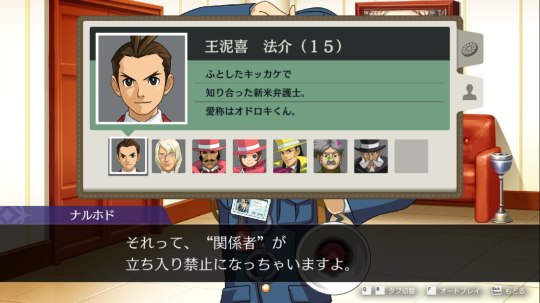
ふとしたキッカケで 知り合った新米弁護士。 愛称はオドロキくん。
futoshita kikkake de shiriatta shin kome bengoshi. Aishō wa Odoroki-kun.
A novice lawyer whom I met by chance. His nickname is Odoroki-kun.
愛称(aisho) - A friendly, affectionate name used to address someone. (syn.) nickname.
In Japan, great importance is attached to friendly names, with their help people show their affection (of course, there are also offensive nicknames, but that's not the topic of the post)
Addressing by last name + warm, friendly suffix -kun shows us a respectful and trusting attitude towards the young lawyer
The dossier was probably entered into the MAISON system after Odoroki started working in Hodo's office, so there was confusion with the content (7 years ago, Odoroki was only 15 years old, he could not have been a lawyer, since he was in school)
Of course, this line is difficult to convey in another language with the same emotions and meaning, so everything was lost again
Yes, the Western world is more accustomed to addressing by name in friendly relations, so this line seemed stupid to everyone, but this was influenced not only by the impossibility of correct adaptation
And also by the way other characters address Odoroki
We will not mention episodic characters, but let's focus on those who appear in each case
The judge addresses Odoroki in two ways:
弁護人 (bengonin) - counsel; defender; advocate
At important and serious moments in the trial
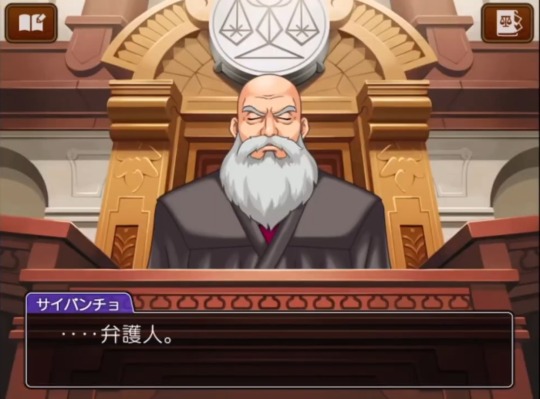
Odoroki-kun - in a situation where the case takes an unexpected turn
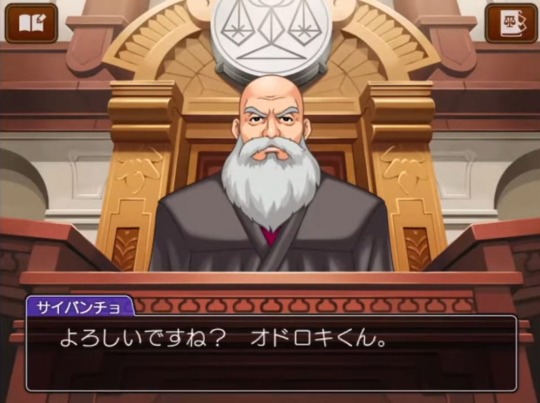
よろしいですね? オドロキくん。
yoroshīdesu ne? Odoroki-kun.
Is that okay? Odoroki-kun.
Minuki Naruhodō (Trucy Wright)
Contrary to all the established impressions that the young magician very quickly begins to address the lawyer informally and behaves very boldly with him, giving him the nickname "Polly", in the original everything is completely different.
Absolutely always, Minuki addresses him exclusively as "Odoroki-san"
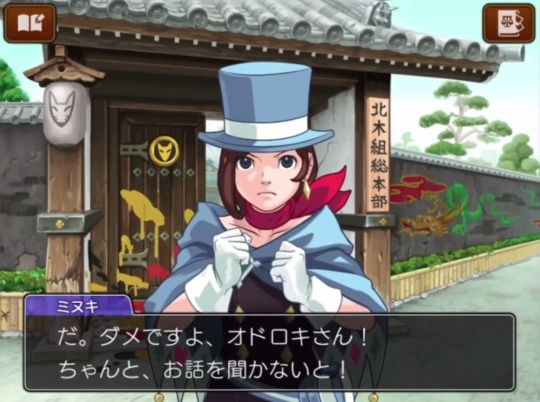
だ。ダメですよ、オドロキさん! ちゃんと、お話を聞かないと!
Damedesuyo, Odoroki-san! Chanto, ohanashi o kikanaito!
No. That's no good, Odoroki-san! You have to listen carefully!
San - さん.
It is the most common Japanese honorific and can be used to address both male and female adults.
Like mister and misses, san is used when you do not know the person very well or when you want to show respect for someone who is not a close friend.
Minuki treats Odoroki with respect, but at the same time keeps him at a respectful distance. She guards her secrets to the very end and simply could not so quickly trust, essentially, a stranger, even if dad told her about him.
This freedom of adaptation changes Minuki's character and a new character, Trucy, appears (although all players should have approximately the same impression of the characters, after all, we are playing the same game).
She continues to call him the same in AA 5 and 6, probably just to accommodate the age difference (as with other adults)
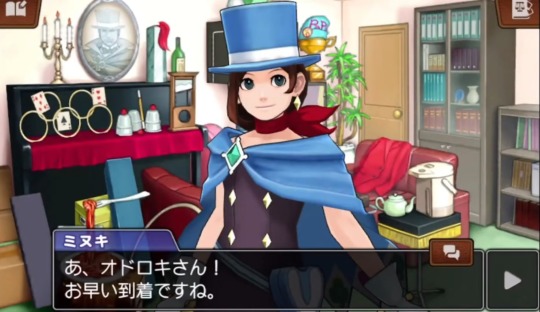
あ、オドロキさん! お早い到着ですね。
a, Odoroki-san! O hayai tōchakudesu ne.
Oh, Odoroki-san! You arrived early.
Kyoya Garyuu (Klavier Gavin)
The prosecutor most often uses a unique and friendly nickname - Odeko-kun (Herr Forehead)
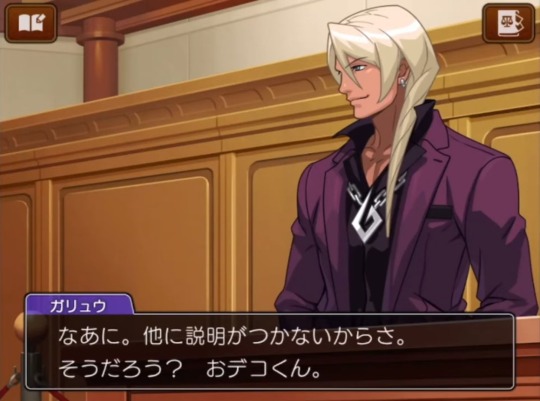
なあに。他に説明がつかないからさ。 そうだろう? おデコくん。
Hoka ni setsumei ga tsukanaikara sa. Sōdarou? Odeko-kun.
What? Because there's no other explanation. Right? Odeko-kun.
But when he's angry, our lawyer suddenly becomes Odoroki Hosuke (as a way to express frustration)
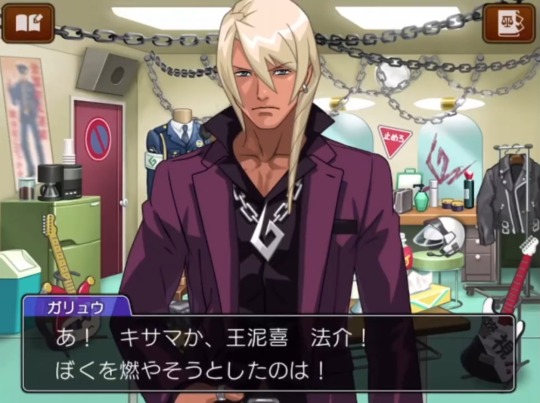
あ! キサマか、王泥喜法介! ぼくを燃やそうとしたのは!
a! Kisamaka, Odoroki Hōsuke! Boku o moyasou to shita no wa!
Ah! You, Odoroki Hosuke! You were the one who tried to burn me!
Kirihito Garyuu (Kristoph Gavin)
Just Odoroki-kun, nothing out of the ordinary
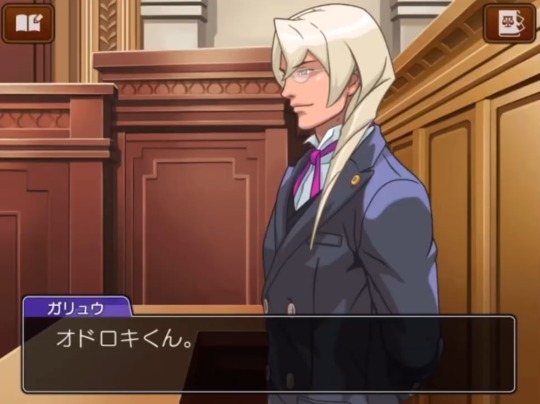
Kokone Kizuki (Athena Cykes)
As a junior co-counsel, she addresses him as "Odoroki-senpai"
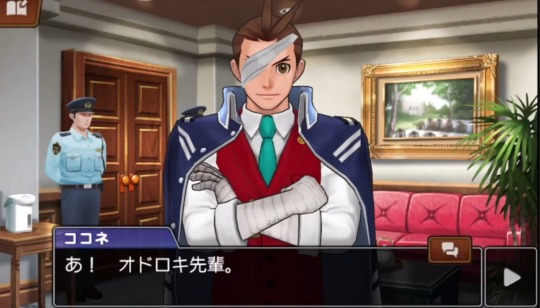
あ! オドロキ先輩。
Ah! Odoroki senpai.
Senpai (先輩、せんぱい, "former born") is used to address or refer to one's older or more senior colleagues and students in a school, workplace etc.
By doing this, she shows respect for her senior colleague and respects subordination.
I understand that it is very difficult to adapt the honorifics that are used in the original version, but it was possible to leave Mr. Justice where he rightfully belongs
#ace attorney#gyakuten saiban#apollo justice#odoroki housuke#phoenix wright#naruhodou ryuuichi#naruhodo minuki#trucy wright#klavier gavin#garyuu kyouya#kristoph gavin#garyuu kirihito#comeback?#in the GKS universe together with croq
249 notes
·
View notes
Text
2025/02/10 寒さも少しましになったか

今朝はお弁当用にご飯を詰めたのに、容器ごとひっくり返しご飯を丸ごと床に落としてしまった。泣ける。台所寒過ぎか。でもおかずの方じゃなくて良かった。
娘を駅に送っていくついでに出勤するためバタバタと慌ただしく朝の支度を済ませ、朝分の内服を引っ掴んで家を出る。電車には間に合ったのであとは自分の職場にゆっくり向かえばよい。
かかりつけ医の血液検査でも貧血が進んでいて予想通り鉄剤が処方された。嫌ね。ツキノモノなんてもう終わってしまえば良いのにと思うけれどホルモンの関係もあるのでそればかりでは無いのだろう。自分の体でも自分では分からないことばかりだ。生きているようで生かされているんだなと思う。
今日も一日なんとか生き延びよう。
50 notes
·
View notes
Quote
「民主党政権のどこがどう悪夢だったのかきちんとした説明を聞いたことがない」という主張は定期的に出現しますね。とはいえさすがに「聞いたことがない」なんてはずはないので、おそらく「自分の気に入る説明ではない」という意味か、「バカに分かるように説明したところで、そもそもバカは聞いてない」パターンのいずれかとは思いますが。 悪夢のような時代を生き抜いてきた者として私が言えるのは、「とにかく、あのような惨劇は二度と繰り返してはならない」ということだけです。あの時代がいかに酷いものであったか、ご存知ない方もぜひこの機会に知って頂きたいので、支持者から叩かれること覚悟で全力で反論していきますね。 個人的に、「悪夢の民主党政権」における大きな問題点は次の3点と考えています。 (1)国家運営能力の欠如により、内政上の失敗を数多く引き起こし、国益を損ない続けた。 (2)拙劣な外交を繰り返し、日米関係をはじめ、周辺諸国からの信頼を大きく毀損した。 (3)総理・閣僚をはじめとする所属議員の度重なる不祥事や、自分たちに都合が悪い情報を隠蔽する体質によって、国民の政治に対する信頼を失い続けた。 では、それぞれどんなことがあったか振り返っていきましょう。はらわたが煮えくり返る覚悟で読み進めてください。 (1)国家運営能力の欠如 ・財源の見込みが甘く、政権交代の際に掲げたマニフェストはほぼ未達成。 ・官僚を敵視して排除し、国家業務の停滞と質低下を招いた。 ・金融政策と財政政策が食い違い、タイミングの悪い増税も重なり、景気や株価は低迷を続けた。 ・歴史的水準まで進んだ円高を放置し、デフレを加速させた。 ・法的根拠がないばかりでなく、仕分人の選定や対象事業選定にも透明性を欠いた「事業仕分け」をデフレ時におこない、必要な公共投資を削減。経済を悪化させたにも関わらず、結果に責任を負わなかった。 ・「コンクリートから人へ」という誤った政策により、災害対策を疎かにしたうえ、地域社会を破壊した。 ・「朝鮮王室儀軌引渡」「尖閣事件の船長釈放」「運用3号通知」「国家公務員採用大幅減」など、閣僚たちが思い付きレベルの意思決定を独断でおこない、結果的に我が国の将来に禍根を残した。 ・法的根拠のない組織を乱立させ、意思決定過程が曖昧になり、指揮命令系統も混乱。 ・法的根拠のない大臣や副大臣を任命したり、個人的な友人を参与に、党職員を内閣官房職員に任命するなど、ルールを無視、公私の別がつかない人事を実施。 ・原発停止、ダム建設中止など、法令根拠や事前協議が必要な決定を手続無視で断行。 (2)外交能力の欠如 ・普天間基地問題が迷走し、沖縄とアメリカの信頼を大きく損なった。 ・来日したオバマ大統領を日本に残したまま、鳩山総理がAPEC首脳会議に出席するためにシンガポールに向かうという非礼行為。 ・尖閣沖漁船衝突事件では、中国側の脅迫や報復に屈して船長を早々に釈放、不起訴に。その後の尖閣諸島国有化でも迷走。 ・領空侵犯が頻発するも、実効的な対策をとらず。 ・韓国に対しては、通貨スワップ協定締結、朝鮮王室儀軌引渡し、慰安婦問題での「知恵を絞っていきたい」発言など、不用意な譲歩を重ねた。 ・韓国の歴代大統領として初めて、竹島へ李明博大統領が上陸。 ・旧ソ連時代を含めて初めて、北方領土へロシア国家元首が上陸。 ・実現に向けた方策が何ら決まっていない状態で、国連気候変動サミットにおいて「CO2の25%削減」を突如国際公約化。 ・実現の見込みも全くないまま、G8の場で、「太陽光パネルを1000万戸に設置する」と突如国際公約をおこなった。 (3)閣僚・所属議員の度重なる不祥事と情報隠蔽体質 ・鳩山総理⇒偽装献金問題、脱税問題、引退撤回、「最低でも県外」「Trust me」「国民の皆様が聞く耳を持たなくなった」 ・菅(直人)総理⇒外国人献金問題、北朝鮮関係団体献金問題、「顔が見たくなければ法案を通せ」 ・野田総理⇒在日韓国人献金問題、脱税企業献金問題、民団選挙協力お礼発言、「大きな音だね」 ・小沢元代表⇒政治資金規正法違反容疑で強制起訴(無罪判決)、献金虚偽記載で公設秘書が逮捕(有罪判決) ・仙谷官房長官⇒尖閣漁船衝突事件、「自衛隊は暴力装置」 ・赤松農水大臣⇒口蹄疫問題、「だから早く殺せって言ってるのに」 ・松本復興担当大臣⇒「知恵を出さないやつは助けない」「書いたらその社は終わりだから」 ・長妻厚労大臣⇒運用3号独断決定、職務停滞 ・蓮舫行政刷新担当大臣⇒事務所費架空計上問題、国会内ファッション雑誌撮影、「2位じゃダメなんでしょうか?」 ・前原外務大臣⇒外国人から政治献金受領 ・川端文科大臣⇒事務所費架空計上問題、キャバクラ費用を政治資金で計上 ・鹿野農水大臣⇒対中不正輸出疑惑、機密漏洩疑惑 ・鉢呂経産大臣⇒「死の街」「放射能をうつす」 ・一川防衛大臣⇒「安全保障に関しては素人」 ・柳田法務大臣⇒「答弁は二つだけ覚えておけばいい」 ・山岡消費者担当大臣⇒マルチ商法業者からの献金問題 ・中井国家公安委員長⇒議員宿舎にホステス連れ込み&カードキー貸与、式典で秋篠宮ご夫妻に「早く座れよ」とヤジ ・小林議員⇒違法献金問題で選対委員長が逮捕、選対幹部が公職選挙法違反で有罪 ・土肥議員⇒竹島領有権放棄を日本側に求める「日韓共同宣言」に署名 ・横峯議員⇒賭けゴルフ、女性暴行、恐喝事件への関与 ・緒方議員⇒「スーパー堤防はスーパー無駄遣い」 ・原発事故対応(SPEEDI、米実測値の非公表、議事録不作成など)、尖閣ビデオ、北朝鮮ミサイル発射への対応、温暖化対策の家計負担、年金改革の財政試算 など、自分たちに都合が悪い情報は隠蔽し、政府への深刻な不信感を招いた。 ・総理-閣僚間で見解の方向性や意見の不一致が常態化。それらも含め、自民党で同様の事態があれば野党のみならずマスコミも総出で吊し上げられる事態となるが、マスコミも概ね民主党に好意的な報道姿勢。 そんなに民主党時代が良かったなら、下野以降何度でも政権を取り戻すチャンスはあったはず。なのにただ一度もそうなっていないということは、それが民意ということです。私もあんな地獄のような時代は二度と御免です。
新田 龍 / X
356 notes
·
View notes
Text
NHKに提訴された日本IBMの反論が生々しい…仕様書に記載ない仕様が満載 | ビジネスジャーナル
大手SIerのプロジェクトマネージャー(PM)はいう。 「10年以上にわたり稼働しているようなシステムに数多くの機能が追加されたり、属人的な運用が行われるようになり、ドキュメント化されていない機能・仕様や運用が存在してしまい、全面的な更改や移行の際に想定以上のコストや開発スケジュール遅延が生じてしまうというケースは非常に多いです。 本来であればそうした仕様は初期の検討や要件定義の段階で発注者側が社内の関係部門を調整して洗い出し、新システムで実装すべき仕様と不要な仕様を選別したり、現場の業務オペレーションが変更になる旨を説明して合意形成を行うべきなのですが、システム部門がそれを十分にできておらず、いざ開発が始まると火を噴き始めるというのは非常によくあるパターンです。 特にシステムに関する知見が乏しかったり、社内の力関係的に業務部門のほうが強かったりすると、そのような事態に陥りやすいです。 そして、開発フェーズに入って想定外の仕様が次々と見つかっても、とにかく当初の費用とスケジュールに収めることをベンダーにゴリ押しする発注者もいます。 NHKがそのようなタイプなのかは分かりませんが、少なくても日本IBMの声明を読む限り、NHKがしっかりとベンダーの言うことに耳を傾けて、対等なパートナーとして課題を解決しようとする姿勢を見せていたのかどうかが気になります」
- - - - - - - - - - - - - - - -
別の大手SIerのシステムエンジニア(SE)はいう。 「気になるのは、現行システムは富士通が開発したものなので次期システムも同社が担当するという流れが自然ですが、違うベンダーが選ばれているという点です。 長年にわたる稼働のなかで複雑化した現行システムの実情をある程度把握している富士通が、多くの開発工数が必要だと考えてコンペで競合他社より高い費用見積もりを提示したことで、より低額の見積もりを提示した他ベンダが選ばれた可能性もあります。 また、もし日本のベンダーであればNHKという大きな重要顧客だということも加味して、ある程度は無理難題を要求されても“自前でなんとかする”というかたちになったかもしれませんが、外資系ベンダーは追加開発に伴う追加費用やスケジュール見直しについて非常にドライに要求する傾向があることも、法的紛争に発展した背景としてはあるかもしれません。
- - - - - - - - - - - - - - - -
山岸純法律事務所の山岸純弁護士はいう。 「システム開発においては、一般的に『要求定義』、すなわち『今はこれだが、これからあれを開発して欲しい』という依頼者側の求めをまとめる作業と、『要件定義』、すなわち『これからこれを開発します』という開発者側の理解をまとめる作業があります。 今回の日本IBMの言い分は、NHKから『今はこれだが』と言われたものが間違っていたので開発するのが難しくなった、というものかと思います。 システム開発の失敗を原因とする裁判をよく見るのですが、『要求定義』か『要件定義』のどちらか、または双方があいまいだったために失敗する例がほとんどです。このため、今後、依頼者側が提出した『要求定義』と、開発者側が提出した『要件定義』と、どちらに非があったのかが争点となります。 こういった裁判で、極めて重要な“決め手”となるのは、キックオフから開発破綻まで、何度も何度も重ねられてきた会議の『議事録』です。裁判ではこの『議事録』をもとに、 ・いつの時点で、 ・開発に関するどんな問題が発生し、 ・各当事者はどのような行動をしたのか、 を過去に戻って紐解いていく作業となります(議事録がない場合は、もはや“泥沼”です)。 はたして日本IBMが言っているように『あの時、このままだとこうなってしまうよ、と言っていたじゃん』といったことが認められる場合には、(契約内容による修正もあるかもしれませんが)『このまま』にしたことがNHKの責めに帰すべき事由なら、損害賠償は認められません。 しかし、システム運用の歴史があるとはいえ、NHKはシステム開発について素人であるのに対し、日本IBMはプロ中のプロです。このため、『こうなるよって、言っていたじゃん』による免責は、ある程度修正されることでしょう」
43 notes
·
View notes